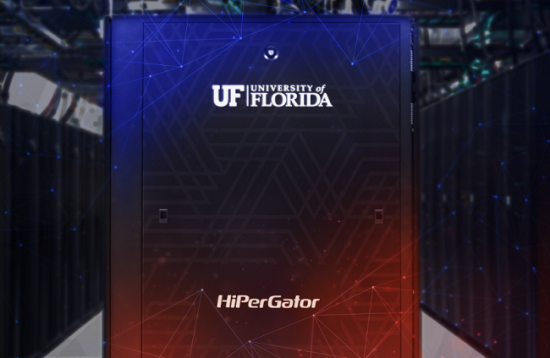HiPerGator, the University of Florida supercomputer, is housed in the UF Data Center (UFDC). While its power and ranking as the most powerful supercomputer in U.S. higher education is well known, not many people know about the components at the UFDC that help keep HiPerGator online and cooled.
Backup Batteries
HiPerGator and the other computers housed in the UFDC, along with the chilled water pumps and air handlers, are run by high-power batteries. These batteries ensure that the computers get clear power without spikes or brown-outs. There is enough power available in the UFDC to keep all systems operating for about 10 minutes after an external utilities power failure. During those 10 minutes, UFDC diesel generators begin providing continuing power. The diesel generator and the chillers cool their water to 55F to send to the air handlers, which then cool the air that is used to cool the computers.
Air Exchange
To get fresh air throughout the UFDC and avoid sick-building syndrome, 10% of the air inside the data hall is constantly replaced with outside air, which is cleaned by removing particles and living mold and spores.
UF Data Center Generators
The UFDC has two generators. One has a horse-power capacity of 2.25 MW and produces 1 MW of electricity if the utilities’ power becomes unavailable. A second, similar 4 MW diesel produces the remaining 2.2 MW of electricity to provide the full 3.2 MW that the UFDC is rated for.
Transparent Floor Tiles
The HiPerGator room has a raised floor of about three feet. This is because the mostly empty space is needed to allow cold air to be delivered to the front of the computers. The fans inside the computers blow the cold air past the hot CPUs, with the hot air being returned through the ceiling to the air handlers in hallways outside the 5000 sq. ft. HiPerGator room.
Air Handlers
Speaking of the air handlers, they blow hot air past the radiators that have 55F water flowing through them. All 125,000 cubic feet of air in the HiPerGator data hall must be replaced twice every minute to avoid HiPerGator overheating! The ideal temperature for the HiPerGator room? It is 60F.
Even with the cooling requirements for a supercomputer, HiPerGator is ranked high up on the worldwide green-500 computing list, and the UF Data Center is a certified LEED® building. Learn more about HiPerGator here.






